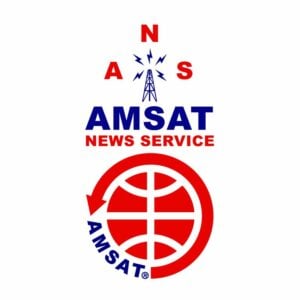

In this edition:
The AMSAT News Service bulletins are a free, weekly news and information service of AMSAT, The Radio Amateur Satellite Corporation. ANS publishes news related to Amateur Radio in Space including reports on the activities of a worldwide group of Amateur Radio operators who share an active interest in designing, building, launching and communicating through analog and digital Amateur Radio satellites.
The news feed on https://www.amsat.org publishes news of Amateur Radio in Space as soon as our volunteers can post it.
Please send any amateur satellite news or reports to: ans-editor [at] amsat.org
You can sign up for free e-mail delivery of the AMSAT News Service Bulletins via the ANS List; to join this list see: https://mailman.amsat.org/postorius/lists/ans.amsat.org/
ARISS held their 40th Anniversary Celebration of the Positive Impact of Amateur Radio on Human Spaceflight at Kennedy Space Center on February 22-24.
Highlights of the event included a surprise live telebridge contact with the ISS via K6DUE where students present at the conference were able to ask questions of Astronauts Loral O'Hara and Jasmin Moghbeli aboard the ISS.
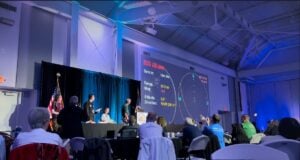
It was also announced that the repaired HamTV module will launch on the SpaceX-30 resupply mission, scheduled for launch on March 12th. HamTV sends a 2.3 GHz amateur television video signal from the ISS to support student contacts and other projects.
Discussions were held regarding the Amateur Radio Exploration (AREx) initiative with plans for amateur radio aboard Lunar Gateway. Teams are currently working with spectrum planners for frequencies between 2.4 and 10.5 GHz and the CAVIAR prototype on-station radio was demonstrated.
Lou McFadin, W5DID, received a special achievement award. Lou has been active in amateur radio in human spaceflight since STS-9.
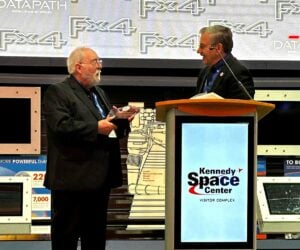
The keynote speaker for the weekend was Richard Garriott, W5KWQ. His conference keynote was a retrospective of his father's amateur radio efforts entitled "Owen Garriott, W5LFL, Ham Radio Pioneer" and he also delieved a banquet keynote entitled "Exploration Endeavors in Space: Experiences and Leadership as a Private Astronaut and in Space Communication in LEO, to the Moon and Beyond."
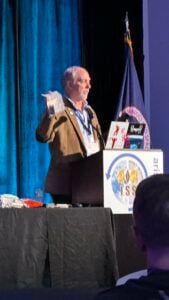
Stay tuned to ANS for further reports from this event.
[ANS thanks ARISS for the above information]
[ANS thanks AMSAT-Francophone for the above information]
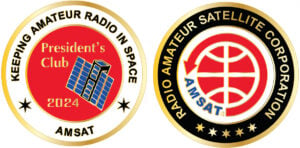
| Call | 1-Feb | 1-Mar |
| WC7V | 1457 | 1550 |
| AA5PK | 1426 | 1450 |
| N8RO | 1423 | 1444 |
| DF2ET | 1200 | 1300 |
| MI6GTY | 970 | 1201 |
| N0JE | 1100 | 1175 |
| KF7R | 1100 | 1128 |
| F4BKV | 1000 | 1100 |
| VE6WQ | 814 | 1007 |
| YO2CMI | 820 | 1003 |
| WI7P | 882 | 975 |
| N8JCM | 917 | 952 |
| JK2XXK | 503 | 903 |
| EA2AA | 883 | 892 |
| KQ4DO | 853 | 880 |
| KK4YEL | 674 | 728 |
| N8MR | 675 | 684 |
| JG6CDH | 605 | 677 |
| VE7PTN | 301 | 635 |
| IK3ITB | 500 | 604 |
| LA6OP | 458 | 600 |
| N7ZO | 501 | 600 |
| N3CAL | 525 | 580 |
| DL6KBG | 500 | 550 |
| VE4MM | 536 | 550 |
| WB7QXU | 500 | 550 |
| HP2VX | 496 | 500 |
| I3BUI | New | 500 |
| JA1GZK | 435 | 500 |
| F6EQD | 311 | 420 |
| PA7RA | 300 | 408 |
| ZS2BK | 305 | 405 |
| KH6WI | 300 | 400 |
| N6PAZ | 369 | 386 |
| JI5USJ | 301 | 355 |
| LA9KY | New | 347 |
| K6VHF | 276 | 300 |
| K7OGW | New | 300 |
| DL5KUA | 128 | 266 |
| KB9DAK | 171 | 255 |
| JF3MKC | 200 | 250 |
| BX1AD | New | 237 |
| KB2MFS | New | 215 |
| PU5DDC | 200 | 213 |
| N2WLS | 104 | 205 |
| W6CZ | 103 | 200 |
| WD9EWK (DM42) | 183 | 189 |
| 7J1ADJ | New | 164 |
| KJ7SXR | New | 151 |
| N4UFO | New | 150 |
| BD8CBU | New | 132 |
| KA9CFD | New | 126 |
| HB9BIN | New | 119 |
| BI1QGX | New | 102 |
| N2YZH | New | 101 |
| AA0K | New | 100 |
| AG1A | New | 100 |
| LZ3SV | New | 100 |
| VK5DG | New | 100 |
Congratulations to the new VUCC holders!
LZ3SV is first VUCC Satellite holder from Bulgaria and KN21
BX1AD is first VUCC Satellite holder from Taiwan and PL04
KJ7SXR is first VUCC Satellite holder from CN86
HB9BIN is first VUCC Satellite holder from JN37
LA9KY is first VUCC Satellite holder from JP65
BI1QGX is first VUCC Satellite holder from ON80
7J1ADJ is first VUCC Satellite holder from PL36
VK5DG is first VUCC Satellite holder from QF02
| Call | 1-Feb | 1-Mar |
| OE9DGV | 210 | 212 |
| SM3NRY | 171 | 174 |
| G4WFQ | 143 | 173 |
| RA3S | 101 | 161 |
| YO2KHK | 151 | 156 |
| OZ9AAR | 151 | 153 |
| DK9JC | 100 | 152 |
| ZS4TX | 128 | 152 |
| UX0FF | 135 | 147 |
| YO2RR | 138 | 142 |
| F6AOJ | 129 | 139 |
| SP3AU | 137 | 138 |
| PA7RA | 113 | 133 |
| IK5CBE | New | 131 |
| IW7DOL | 122 | 127 |
| K8DP | 122 | 125 |
| XE1MEX | 115 | 122 |
| FG8OJ | 114 | 116 |
| LA0FA | 109 | 112 |
| UW7LL | New | 107 |
| NS3L | 100 | 104 |
| EA5RM | 101 | 103 |
| DL5KUA | New | 101 |
| AC9O | New | 100 |
Congratulations to the new DXCC Satellite holders!
IK5CBE is first DXCC Satellite holder from JN53
DL5KUA is first DXCC Satellite holder from JO53
[ANS thanks Jon Goering, N7AZ, for the above information]
Two Line Elements or TLEs, often referred to as Keplerian elements or keps in the amateur community, are the inputs to the SGP4 standard mathematical model of spacecraft orbits used by most amateur tracking programs. Weekly updates are completely adequate for most amateur satellites. TLE bulletin files are updated Thursday evenings around 2300 UTC, or more frequently if new high interest satellites are launched. More information may be found at https://www.amsat.org/keplerian-elements-resources/
The following satellite has been removed from this week's AMSAT-NA TLE distribution:
IT-SPINS NORAD Cat ID 49017 Decayed from orbit on or about 25 February 2024
[ANS thanks Joe Fitzgerald, KM1P, AMSAT Orbital Elements Manager, for the above information]
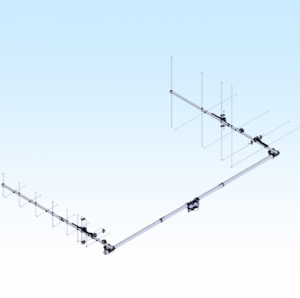
Amateurs and others around the world may listen in on contacts between amateurs operating in schools and allowing students to interact with astronauts and cosmonauts aboard the International Space Station. The downlink frequency on which to listen is 145.800 MHz worldwide.
“IES Pedro Simón” Abril High School, Alcaraz, Spain, telebridge via K6DUE
The ISS callsign is presently scheduled to be NA1SS
The scheduled crewmember is Loral O’Hara KI5TOM
The ARISS mentor is IKØUSO
Contact is go for: Mon 2024-03-04 11:21:02 UTC 70 deg
Watch for Livestream at https://www.youtube.com/watch?v=9Xgk4YZT5w4
As always, if there is an EVA, a docking, or an undocking; the ARISS radios are turned off as part of the safety protocol.
The crossband repeater continues to be active (145.990 MHz up {PL 67} & 437.800 MHz down), If any crewmember is so inclined, all they have to do is pick up the microphone, raise the volume up, and talk on the crossband repeater. So give a listen, you just never know.
Note, all times are approximate. It is recommended that you do your own orbital prediction or start listening about 10 minutes before the listed time.
The latest information on the operation mode can be found at https://www.ariss.org/current-status-of-iss-stations.html
The latest list of frequencies in use can be found at https://www.ariss.org/contact-the-iss.html
[ANS thanks Charlie Sufana, AJ9N, one of the ARISS operation team mentors for the above information]
From…me! (K5ZM) I’ll be heading back to SGU for some sorely needed R & R and will be there from Saturday, 2 Mar through Saturday, 9 Mar and leaving on the morning of the 10th. Rove-wise, the main objectives are reactivations of the DM46/DM47 & DM56/DM57 gridlines, plus a trip just a bit farther south for the DM44/DM45 gridline -that will be new /r for me. Given the windshield time involved, I’m thinking these will take the form of a Mon/Wed/Fri scenario, but that’s not set in stone. I don’t necessarily care about the order in which I do them. Let me know your thoughts. I’ll probably hit DM36 (and of course DM37) and maybe another grid or two in between.
NOIRMOUTIER ISLAND SAT DXPEDITION 2024
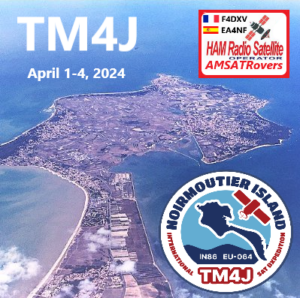
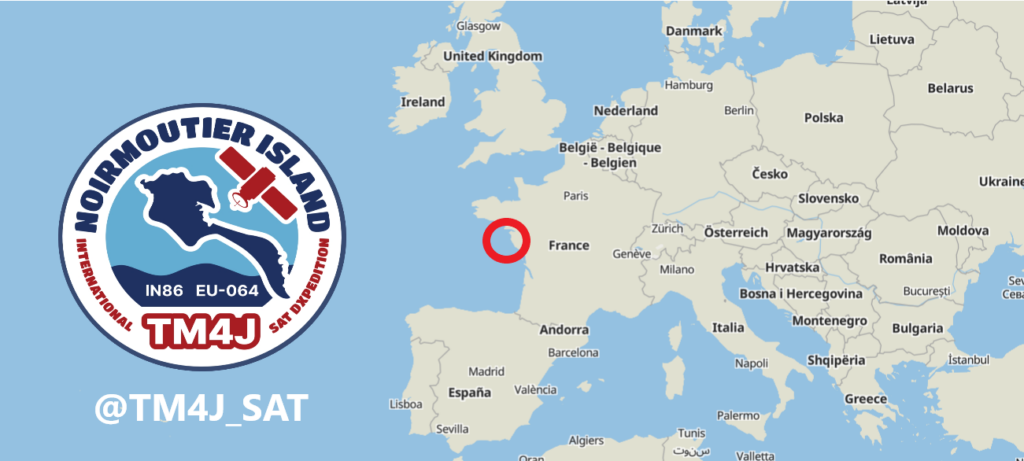
F4DXV Jérôme (@F4DXV) and EA4NF Philippe (@EA4NF_SAT) announce that they will be actívating Noirmoutier island EU-064 IN86 from April 1 to 4, 2024 with the special callsign TM4J
This International DXpedition is the 1st 100% SAT from this French island.
Updates available on @TM4J_SAT
[ANS thanks Ian Parsons, K5ZM, AMSAT Rover Page Manager, for the above information]
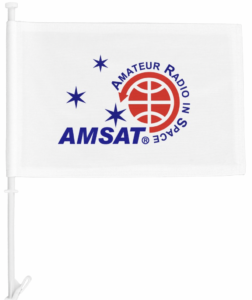
AMSAT Ambassadors provide presentations, demonstrate communicating through amateur satellites, and host information tables at club meetings, hamfests, conventions, maker faires, and other events.
AMSAT Ambassador Clint Bradford, K6LCS, says,
"Think a 75-minute presentation on "working the easy satellites" would be appropriate for your club or event? Let me know by emailing me at k6lcsclint (at) gmail (dot) com or calling me at 909-999-SATS (7287)!"
Clint has NEVER given the exact same show twice: EACH of the 150+ presentations so far has been customized/tailored to their audiences.
2024 CubeSat Developer’s Workshop
April 23-25, 2024
San Luis Obispo, CA
https://www.cubesatdw.org/
Dayton Hamvention 2024
Friday May 17th through Sunday May 19th, 2024
Greene County Fairgrounds and Expo Center
120 Fairground Road
Xenia, OH 45385
https://hamvention.org
[ANS thanks Clint Bradford, K6LCS, and AMSAT for the above information]
+ Longtime satellite operator and AMSAT member George Carr, WA5KBH, became a silent key on Sunday, February 25, 2024. His obituary can be found at https://www.johnsonfuneralhome.net/obits/deacon-george-k-carr-ii/. George was a frequent and friendly presence on amateur satellites for many years. AMSAT extends our condolences to George's family and friends.
+ Bob Heil, K9EID, became a silent key this past week after a battle with cancer. From the Heil Facebook page:
"Our beloved founder, Dr. Bob Heil, K9EID, is now a Silent Key. Bob fought a valiant, year-long battle with cancer, and passed peacefully surrounded by his family. Bob’s lifelong passion for amateur radio was clear to everyone involved in the hobby. Everything Bob did for the betterment and growth of amateur radio - from his instructional handbooks and countless presentations to his support of the ARRL and youth programs - was based on the foundation and spirit of service. Bob was an Elmer to all of us. While Bob’s presence will dearly be missed, his impact on the hobby and everyone in it will forever be felt. On behalf of Bob to all ham radio operators worldwide, 73."
Dr. Heil was a longtime friend of AMSAT and we extend our condolences to his family and friends.
(ANS thanks Heil for the above information.)
+ After spending over a decade on a mission in space, a defunct 5,000 pound satellite returned to Earth on Feb. 21, splashing down in the Pacific Ocean somewhere between Alaska and Hawaii. After tracking the dead satellite for most of the day, the European Space Agency confirmed the satellite had returned to earth by about 19:30 UTC. ERS-2 launched in 1995 and was initially planned to serve the ESA for three years. However, it remained in operation until 2011, providing data for over 5,000 projects, including tracking Earth's shrinking polar ice, sea levels and atmospheric make-up. The majority of the 2.5 ton satellite disintegrated in Earth's atmosphere, though remaining debris likely landed in the north Pacific. (ANS thanks USA Today for the above information.)
+ The International Space Station (ISS) took more than a quarter-century, 42 space launches, and $150 billion to build. Voyager Space is cooperating with multiple companies and space agencies, including Europe's Airbus, American defense contractor Northrop Grumman, and -- intriguingly -- Hilton Hotels, to build a "Starlab" commercial space station to replace the aging ISS. On Jan. 31, the Starlab space station team announced that it had hired SpaceX to launch its entire Starlab space station to Low Earth Orbit "in a single mission prior to the decommissioning of the International Space Station." SpaceX will use its new Starship megarocket for this mission. Furthermore, "Starlab will ... be fully outfitted on the ground, and ready to permanently host four crew members in LEO to conduct microgravity research and advanced scientific discovery," say the companies. (ANS thanks Yahoo! Finance and the Motley Fool for the above information.)
+ India has unveiled four Air Force pilots who have been shortlisted to travel on the country's maiden space flight scheduled for next year. The Gaganyaan mission aims to send three astronauts to an orbit of 400km and bring them back after three days. India's space agency, ISRO, has been carrying out a number of tests to prepare for the flight. The officers were introduced as Group Captain Prashanth Balakrishnan Nair, Group Captain Ajit Krishnan, Group Captain Angad Pratap and Wing Commander Shubhanshu Shukla. If it succeeds, India will become only the fourth country to send a human into space after the Soviet Union, the U.S. and China. (ANS thanks the BBC for the above information.)
+ SLIM, the wrong-side-up Japanese lander, which had been hibernating through the two-week-long, -130 °C lunar night and the following week of unfavorable illumination angles (due to its aforementioned tipsy state), has somewhat surprisingly responded to commands from JAXA. The mission was not originally designed to survive the frigid night time temperatures. However, in a bit of situational irony, the agency had to shut the lander down again almost immediately due to overheating of the communications equipment in the 100 °C+ lunar mid-day. (ANS thanks the Orbital Index for the above information.)
Join AMSAT today at https://launch.amsat.org/
In addition to regular membership, AMSAT offers membership to:
Contact info [at] amsat.org for additional membership information.
73 and remember to help Keep Amateur Radio in Space!
This week's ANS Editor,
Paul Stoetzer, N8HM
n8hm [at] amsat.org
ANS is a service of AMSAT, the Radio Amateur Satellite Corporation, 712 H Street NE, Suite 1653, Washington, DC 20002